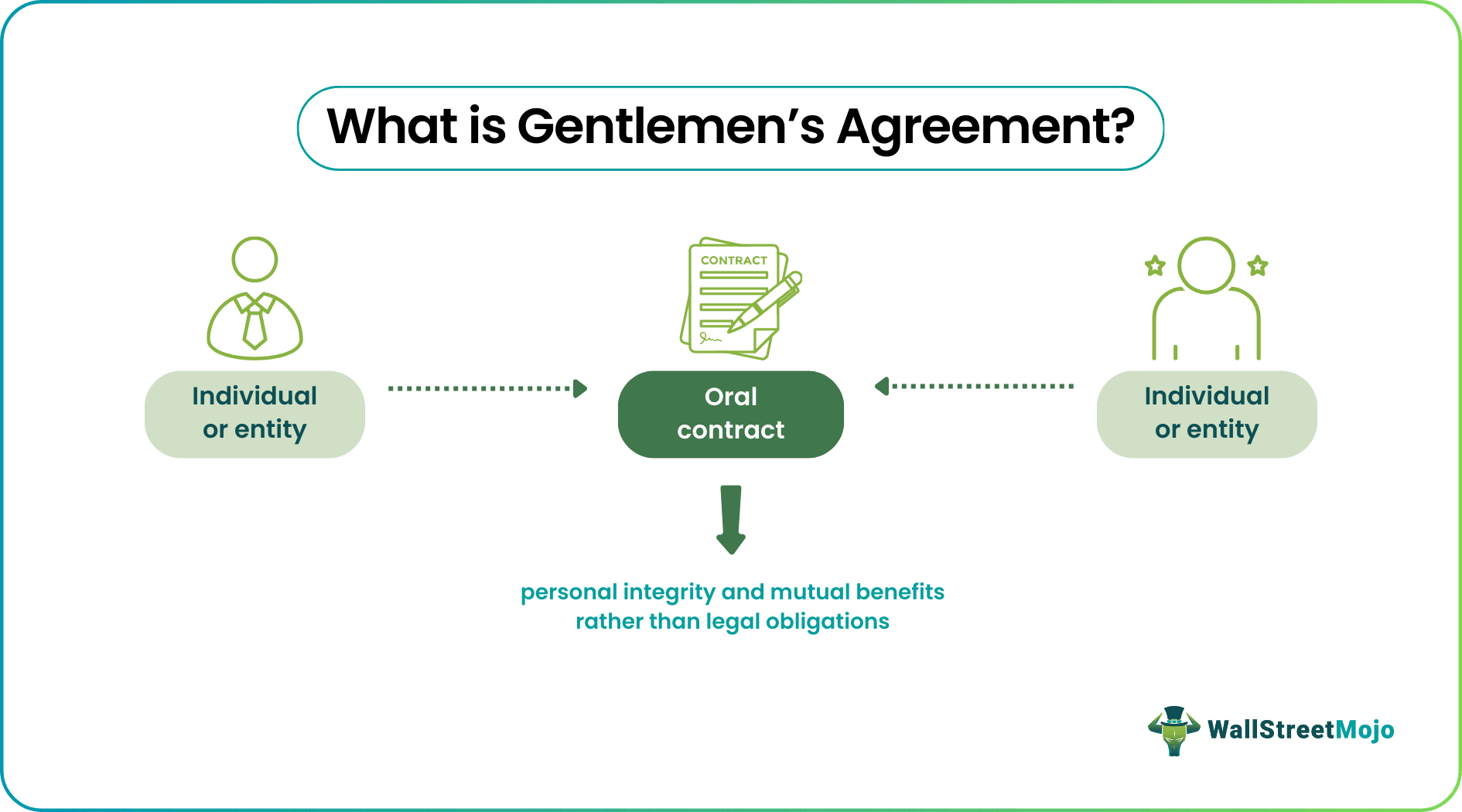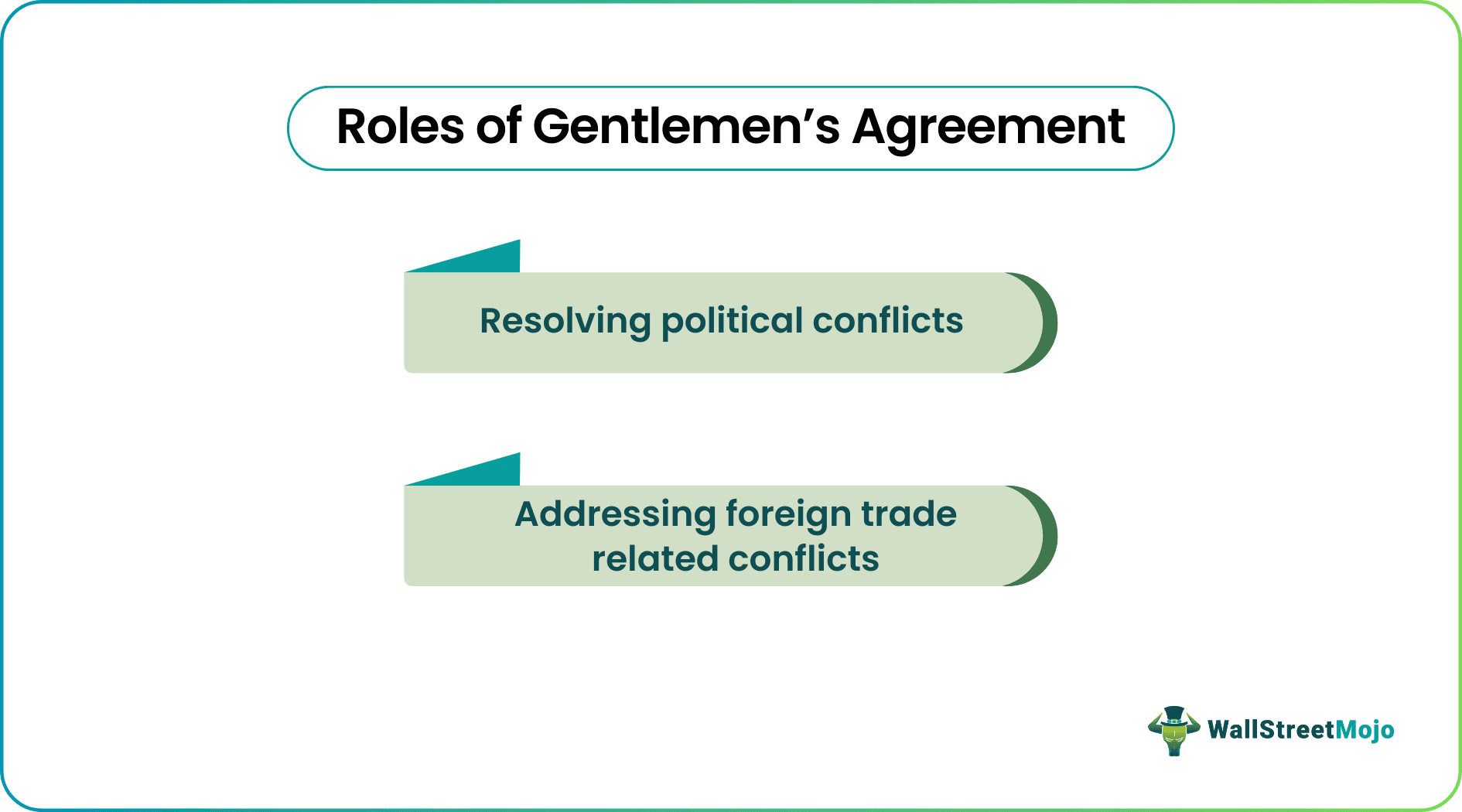Table Of Contents
Gentlemen's Agreements Definition
A gentlemen's agreement is a contract made between two or more individuals or entities based on personal integrity rather than legal obligations. Even though its terms are not legally binding, non-compliance is often viewed as a betrayal. One of the foremost times when history witnessed a gentlemen’s agreement sample was in 1907 between the U.S. and Japan.

Even though it is not legally binding, a breach of trust may tarnish the offender's image in their social circles if such an agreement is made. While it is oral, the agreement can also be written or implied by circumstances. The century-long gentleman's agreement history shows its effectiveness in solving political and trade-related issues on a large scale over the years.
Key Takeaways
- A gentlemen's agreement is an oral, non-legally binding contract between persons or entities. It relies on reputation, mutual benefits, and honor to be upheld.
- Unlike a legal agreement, it is a valid form of contract, and hence it should be used with caution because it is difficult to prove in court.
- It has been widely used to deal with political and business affairs because they can be secretive and are not legally binding to the government or board of directors that take office after the agreement is signed.
- Influential people or entities should be careful when entering into such an agreement as failure to keep their words may result in backlashes.
How Does Gentlemen's Agreement Work?
A gentlemen's agreement is a non-legally binding arrangement. So, there is no proper way to provide a comprehensive overview of its inner workings. With that said, various circumstances surround this type of accord. It has also proven to be an effective method in resolving various political and foreign trade conflicts.

Many business magnates have used loose contracts to solve problems in an informal yet effective manner throughout history. However, regulations made it difficult for steel, tobacco, automobile, and other industries to impose their business practices to control costs and restrict competition in the early 1900s.
Consider the gentlemen's agreement of 1907 between the United States and the Japanese Empire. Then, Japanese immigration to the United States and prejudice against them were common concerns. As part of the deal, Japan prohibited its citizens from immigrating to the United States in return for U.S. cooperation in easing the segregation law against Japanese citizens living in the U.S. This agreement aided the U.S.-Japan relationship by implicitly prohibiting Japanese emigration to the U.S. while giving Japan recognition.
Even though this arrangement was never drafted into a gentlemen’s agreement law, it remained in effect until the U.S. Congress passed the Immigration Act of 1924. It explicitly prohibited all Japanese immigrants from entering the U.S.
History
In 1907, President Roosevelt chose to forego passing a discriminatory and offensive immigration law and entered into an agreement with Japan, the then-rising global powerhouse.
If the United States passed a law discriminating against other races, it stood a chance to offend the Japanese government which it could not afford as it was politically necessary to be in the good books of Japan as they were rising faster than most countries in the world at that point in time.
Therefore, a series of agreements, even though non-binding and informal in nature, Japan agreed to stop issuing passports to restrict further emigrations to the United States. In return, the US agreed to not impose restrictions on the existing Japanese population in the country.
Even though a gentlemen’s agreement law was not passed, the agreement was adhered to by both countries until the US passed the immigration act of 1924 where it clearly prohibited Japanese immigrants to enter American soil.
Why Is It Effective?
Gentlemen's agreements do, in reality, work well in the face of world-changing incidents. History in this regard, has been a valid proof that this concept works well. The same has been reiterated through the points below.
- Though a gentlemen’s agreement sample is not legally binding and covered by contract law, the risk of tarnishing reputation is sometimes enough to deter parties from breaching it.
- It is uncommon for a group to break the agreement because it is mutually beneficial.
- Breaching such a contract with a public figure is almost impossible.
- Ethics and honor are still vital in many societies, and everyone in a position of power understands the importance of following a self-imposed code.
Examples
Despite these understanding not being converted into a gentlemen’s agreement law, they have been followed due to social status and peer pressure. Let us understand the concept and its intricacies with the help of a few examples.
#1 - Agreements Between the Steel and Iron Industries in 1890
Industry owners used this arrangement to control rates, steel and iron productions, and any forfeiture clauses in the event of a dispute between the parties.
#2 - Automotive Industry Agreements in 1989
Japanese and European automakers reached these agreements. The Japanese companies capped the performance of their production cars in Europe at 276 horsepower. Japan-based German automakers restricted high-performance sedans and station wagons to a top speed of 250 km/h. The agreement came to an end in October 2004.
#3 - Foreign Trade Policies and Monetary Exchanges
If two or more international parties do not wish to sign a treaty or assume an actual contract, they will enter the agreement. These kinds of deals are not binding to the next administration. And they are used behind the scenes and in secrecy to strengthen relationships.
#4 - Discriminate Against Poor People
These agreements are not only used to strengthen state-to-state ties or make money. They also discriminate against lower-class citizens in many upper-class neighborhoods or keep out parties that the citizens do not like.
They are widely disseminated and unregulated by the law because of their secrecy. This issue is particularly evident in the U.S., where upper-class communities are overwhelmingly Whites in most states.
Does It Hold Up In Court?
Anyone would expect that gentlemen's agreements are non-legally binding and generally oral, so they should not be kept liable in court. It is worth noting that a contract does not have to be written to be enforceable.
In reality, one party makes an offer, and the other accepts it. Hence, if there is any intention to form legal relationships and valuables are exchanged, the agreement can be held in court.
And if one of these is missing, the contract is null and void and cannot be used in court. Thus, gentlemen's agreements can be held in court, but they must meet criteria before being implemented in a legal setting.
Also, it will be hard to prove that those requirements are fulfilled without a written form. For example, web designers and programmers should never transfer ownership orally. Similarly, an aspiring business owner should be wary of those who want to use these forms of informal contracts. In the same way, copyright and trademarks are only legally binding in written form.
In summation, a gentlemen’s agreement sample even though is an understanding between two parties, it is always better to have it drafted on paper to seal the agreement. This way it can be contested in a court of law in case of discrepancies from any of the parties involved.
Frequently Asked Questions (FAQs)
A gentlemen's agreement is a contract between two or more individuals or entities based on personal integrity rather than legal duties. The agreement can be written or implied by circumstances, even if it is oral. A breach of trust is often seen as a betrayal and may ruin the offender's image, although contract terms are not legally binding. The century-long gentlemen's agreement history reveals its utilization on a broad scale to resolve political and trade concerns over the years.
The gentlemen's agreement of 1907 was between the United States and the Japanese Empire. In exchange for the U.S. support in easing the segregation rule in the country, Japan restricted its residents from going to the U.S. This agreement was in existence until Congress passed the Immigration Act of 1924.
Because the gentlemen's agreements are often oral and not legally enforceable, they should not be held liable in court. On the other hand, it can be held in court if there is any intention of forming legal connections and valuables are exchanged. If one of these elements is absent, the contract is worthless and cannot be enforced in court.
